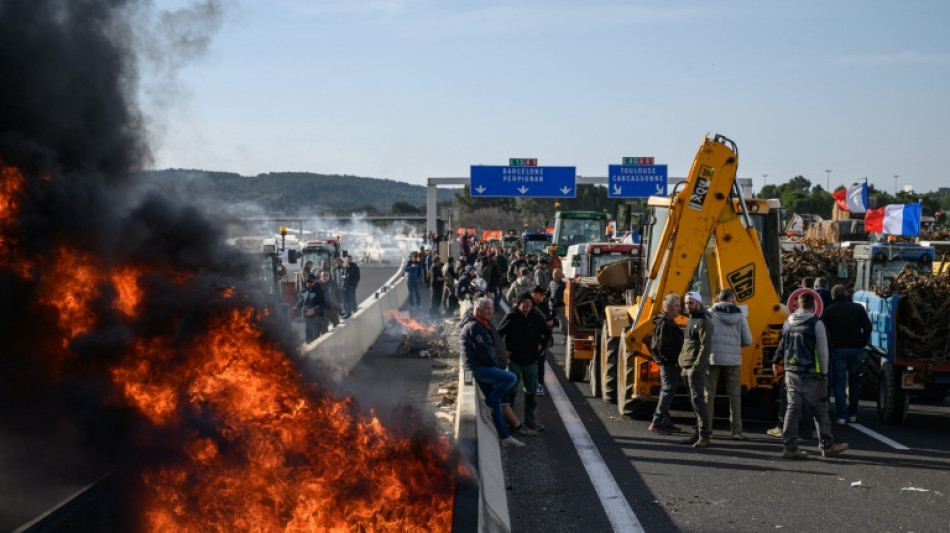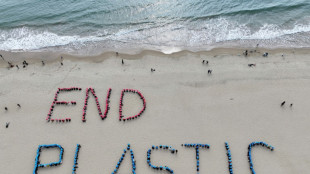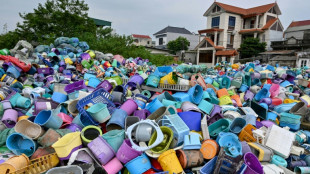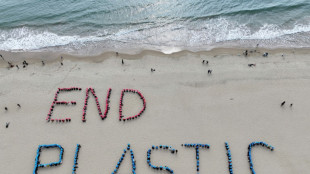

French farmers win concessions after moving to besiege Paris
France's top farmers' union won a number of concessions from the government on Friday after it blockaded major routes into Paris in protests focused on pay, taxes and regulations.
Facing his first major crisis as prime minister, Gabriel Attal visited a cattle farm in the Haute-Garonne department in southwest France, scene of the first motorway roadblocks, to announce the measures.
"You wanted to send a message, and I've received it loud and clear," he told his audience. "I have been listening."
Attal said the government would "put an end" to the rising cost of diesel fuel used for farming machinery which has been a consequence of tax breaks on the fuel being phased out.
There would also be an emergency fund to help cattle farmers battle illnesses among their livestock.
"We have decided to place agriculture above everything else," Attal said.
The government has been trying to keep discontent among farmers from spreading months ahead of European Parliament elections which is seen as a key test for President Emmanuel Macron's government.
Friday's encirclement of the capital followed days of disruption on motorways as well as tractor convoys through major cities and protests in front of government buildings.
Protesters on the A10 motorway west of Paris hung an effigy of a farmer in overalls from a mock gallows.
The A1 motorway heading north from Paris was blocked from Friday morning by tractors and hay bales, causing big jams.
In the south, around 400 kilometres (250 miles) of motorway were shut between the Lyon region and the Spanish border.
"We don't want any more words, we want acts," said Sebastien, a 21-year-old farmer at a blockade slowing traffic around the Blagnac airport outside Toulouse, ahead of Attal's announcements.
- 'Weighing us down' -
Attal had gathered his economy, environment and agriculture ministers on Thursday, as the farmers' movement reached new heights with major protests and blockades.
The rallies mobilised around 55,000 people, according to the FNSEA.
Agriculture Minister Marc Fesneau earlier Friday warned food manufacturers and supermarkets that they could face fines if they fail to obey laws on farmers' pay, after receiving an update on purchasing talks between retailers and their suppliers.
"We need operators who are economically responsible and patriotic about French agriculture," the minister said.
Farmers have fumed at what they say is a squeeze on purchase prices for produce by supermarket and industrial buyers, as well as complex environmental regulations.
But the last straw for many was the phasing out of a tax break on diesel for farm equipment.
The agricultural fuel tax "is a real priority, a crucial cost reduction," said Thierry Cazemajou, who grows corn and green beans for a major canned-vegetables brand.
"It's weighing us down," he said.
Others have called for binding minimum prices for their farm produce, speedier aid payouts or a pause on restrictions on pesticide use.
On Friday, Attal said the government would also seek to simplify administrative tasks for farmers, and inject subsidies into organic farming.
Some of the FNSEA's 140 demands could only be met with new legislation or tricky negotiations at the European Union level.
Demonstrators have thrown a spotlight on resented free trade agreements between the European Union and food exporters, especially a deal with South American bloc Mercosur that is still in the works.
Attal said France was "against" the deal which is up to the EU Commission to negotiate.
Farmers charge that their non-EU competitors abroad do not have to meet the same standards on issues such as pesticide use.
- Police holding back -
The authorities have held back from intervening by force against road blockades and other forms of protest, including defacement or break-ins at government buildings and food industry sites such as supermarkets and warehouses.
On Friday, an empty rural social insurance building was set ablaze in southern city Narbonne as farmers demonstrated nearby.
"There's no cause that can justify property damage or violence... (but) at present there are unfortunately farmers who feel desperate," Young Farmers (JA) union chief Arnaud Gaillot had earlier told broadcaster Sud Radio.
"The situation mustn't be allowed to turn sour. The government can't send a message that it doesn't care or isn't living up to its responsibilities," he added.
burs/jh
H.Giordano--IM



